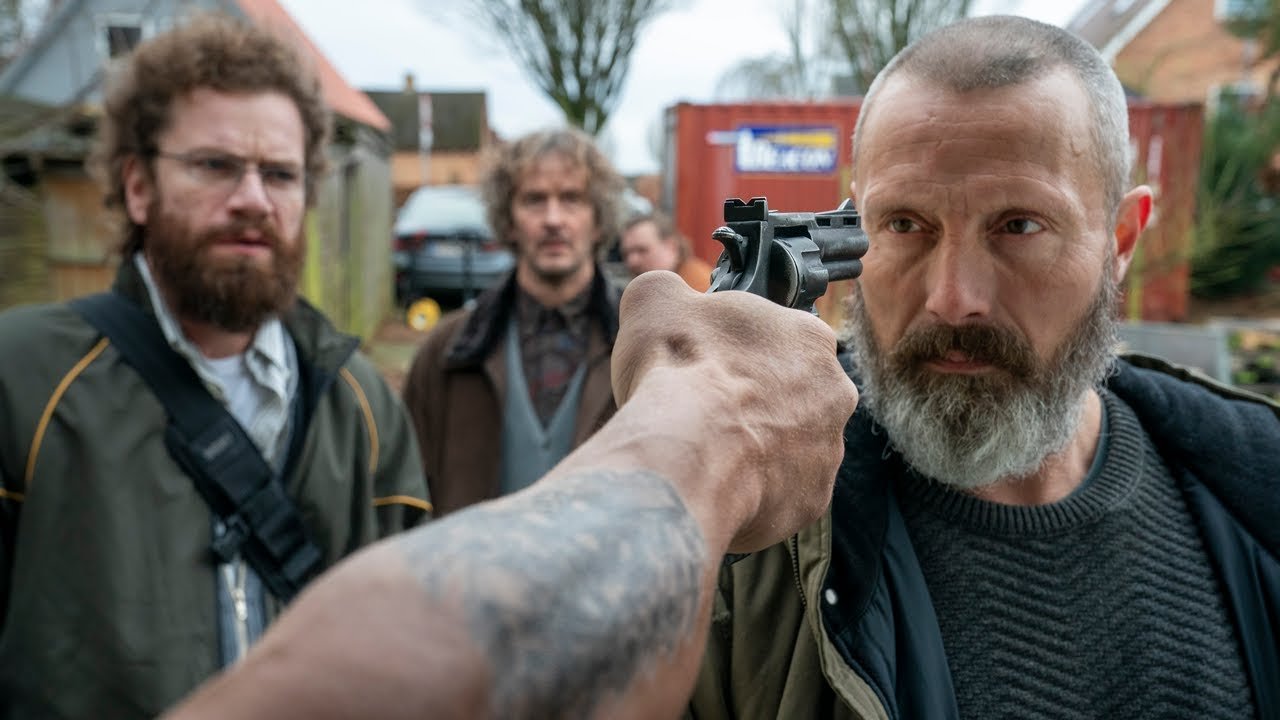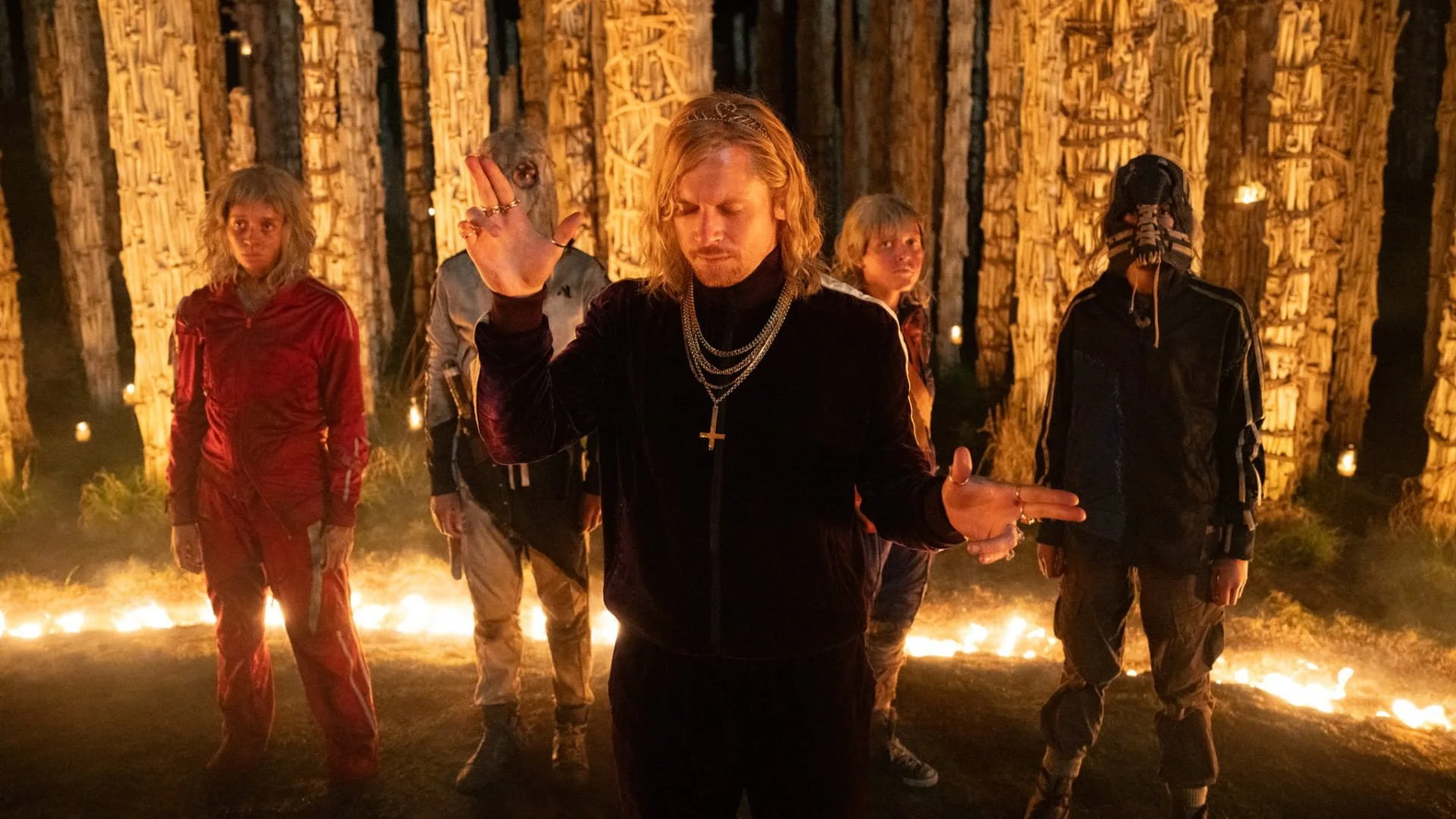Review: Riders of Justice (2020)
One of the great pleasures of cinema is watching a film play out in ways you didn’t expect. Such is the case with Anders Thomas Jensen’s Riders of Justice, a Danish action dramedy that sounds like a revenge flick from its plot description. Mads Mikkelsen plays Markus, a soldier stationed in Afghanistan, who gets called home when his wife, Emma (Anne Birgitte Lind), dies tragically in a train accident. But another man on the train, statistician Otto (Nikolaj Lie Kaas), says that it wasn’t an accident, but actually an elaborate plot by a motorcycle gang, the Riders of Justice, to kill a rival gangster about to testify against them. Otto offers Markus a chance for revenge, and Markus, the stoic, repressed soldier, takes it.
But Riders of Justice is not a conventional revenge flick. It’s not about the moral cost of violence, like Blue Ruin, nor is it a film built around elaborately choreographed set-pieces that revel in the violence, like John Wick. Rather, it’s a heartfelt story about bonding and the need to come to terms with your emotions. It turns out to be a film about brotherhood and community and how we find meaning in our lives, not unlike another recent film starring Mads Mikkelsen, the Oscar-winning Another Round.
The opening sequence clues you into the intellectual interests of writer-director, Anders Thomas Jensen. In Tallinn, Estonia, we see a priest looking at bicycles for sale with his niece. She wants one for Christmas, but she doesn’t want the red one. She wants a blue one, which the kiosk doesn’t have. So they walk away and the priest tells her that Christmas is far away and you can never be sure of getting what you’ll get. Cut to a train station in Denmark and two men jump out of a van, cut the lock off a fresh looking blue bicycle chained to a fence, and put it in the back of their van. This bike belongs to Markus’s daughter, Mathilde (Andrea Heick Gadeberg), and its theft sets the entire film in motion.
Because Mathilde’s bike is stolen, she cannot get to school on time. So her mom, Emma, decides to drive her, but the car’s engine isn’t working. So they take the train. On the train, Otto offers Emma her seat. She takes it. Seconds later, the train hits another train and everyone seated on that side of the train is killed. Otto and Mathilde survive by random chance. Or do they? Riders of Justice is about how you make sense of things that may or may not be coincidences. Do you let the mystery flow over you, get lost in the possible connections, or latch onto one aspect of the chaos and use that to explain it away?
For men like Markus, Otto, and Otto’s fellow data analysts, Lennart (Lars Brygmann) and Emmenthaler (Nicolas Bro), who join them in their quest for revenge, you do the latter of these options, which is try to suss meaning out of a surplus of noisy data. Otto, Lennart, and Emmenthaler help Markus hack into systems and track down the gang members of Riders of Justice. Markus then puts his years as a soldier to good use, dispatching them mercilessly. The action scenes are crisply shot and pack a surprising punch—Jensen has the command and clarity of visual style to make a good action film if he wanted. For instance, an ambush outside a bar on the docks is especially brutal and effective.
But as I said at the outset, this film is not a grim and gritty revenge drama that is mired in human misery. Rather, it’s a surprisingly emotional film with a killer comedic streak. The film walks a fine line between sardonic humour during its action scenes and off-kilter emotional bonding in its moments of respite. For instance, as Mathilde notices her father spending time with Otto, Lennart, and Emmenthaler, Lennart cooks up a scheme pretending to be psychologists there to help them process their trauma. He puts Mathilde through rigorous, and humorous, therapy sessions, borrowing from his own ample experience of going to therapy. And Mathilde believes him because she so badly wants to believe that her dad is seeking help and finally opening himself up emotionally. These people want connection and community so badly that they end up finding it amidst the dysfunction of their situation.
Mads Mikkelsen predictably gives a great performance, allowing us to glimpse the pain through his stoic exterior, but never playing as maudlin or empty. An eventual breakdown in his bathroom is cathartic precisely because we’ve witnessed Markus struggling so much to contain his rage throughout the film. But the whole cast is uniformly great, from Nicolas Bro’s foulmouthed irritability as Emmenthaler to Andrea Heick Gadeberg’s earnest yearning for comfort as Mathilde to memorable bit parts by Albert Rudbeck Lindhardt as Mathilde’s emotionally-sensitive boyfriend and Gustav Lindh as a male prostitute the group rescues from the gang.
By the film’s end, you feel like you know these people well enough to understand how they process their pain, but not to the point where their humanity has been shrunk down to the point of longer seeming realistic. They remain mysteriously human throughout, and never function simply as plot constructions. That’s a sign of strong character writing and proof that Riders of Justice is not programmatic, no matter how therapeutic its storytelling becomes. At its heart, it’s about human beings grappling with the meaning of life and finding comfort in others sharing in the search. That such meaning also comes from a foul comedy about killing gangsters proves what an idiosyncratic and delightful film it is.
8 out of 10
Riders of Justice (2020, Denmark)
Written and directed by Anders Thomas Jensen; starring Mads Mikkelsen, Nikolaj Lie Kaas, Andrea Heick Gadeberg, Lars Brygmann, Nicolas Bro, Gustav Lindh, Roland Møller, Albert Rudbeck Lindhardt, Anne Birgitte Lind.



This mockumentary starring Matt Johnson and Jay McCarrol is a complex metafiction farce and a loving portrait of friendship and Toronto.